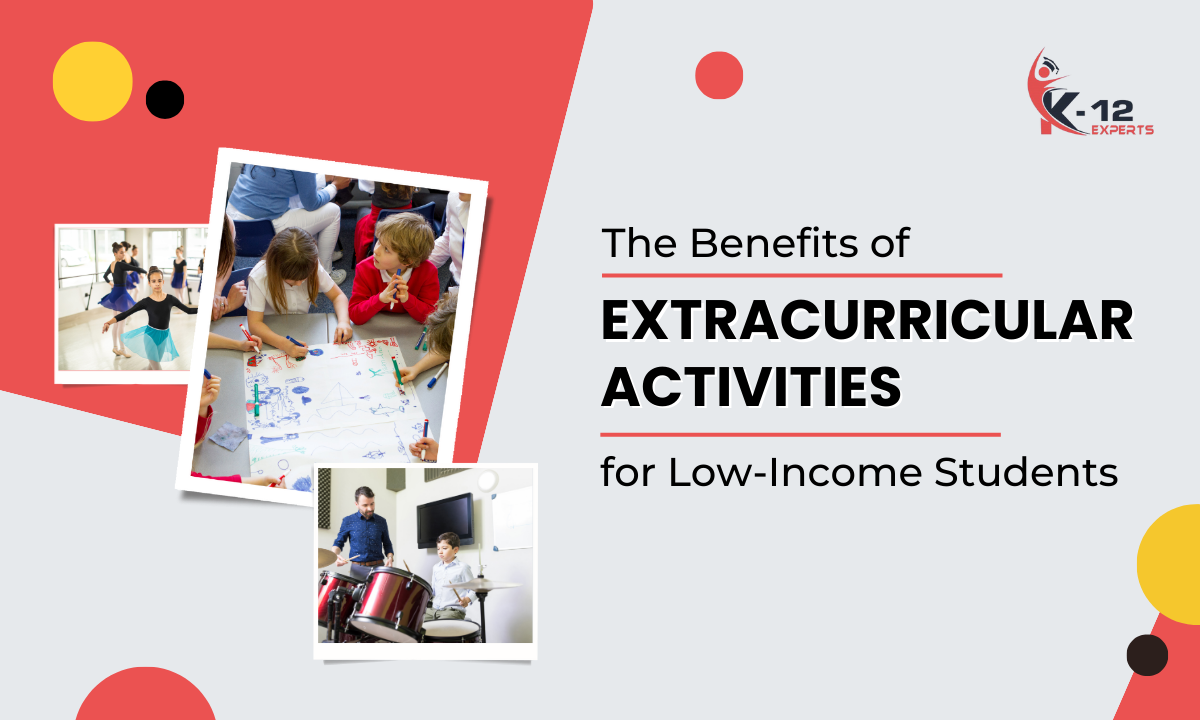You’re not just joining a club or team when you participate in extracurricular activities – you’re building confidence, developing valuable life skills, and accessing resources that can change your life. As a low-income student, these activities can help you overcome economic barriers and empower you to achieve your academic and professional goals. By gaining access to mentorship, networking opportunities, and state-of-the-art facilities, you’ll develop essential skills like financial literacy and time management. But that’s just the beginning – the real question is, how can you leverage these benefits to create a brighter future?
Building Confidence Through Activities
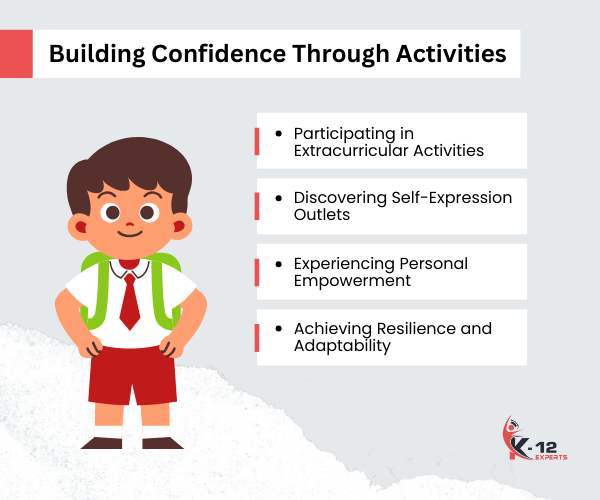
Participating in extracurricular activities often provides you with a unique opportunity to build confidence as you take on new challenges, develop skills, and receive constructive feedback from peers and mentors.
You’ll discover self-expression outlets that help you communicate your thoughts, feelings, and ideas more effectively. Whether it’s through art, music, writing, or sports, you’ll find a platform to express yourself authentically.
As you progress, you’ll experience personal empowerment, recognize your strengths and weaknesses, and develop a growth mindset. You’ll learn to take calculated risks, step out of your comfort zone, and believe in your abilities.
With each achievement, your confidence will grow, and you’ll become more resilient, adaptable, and determined. This newfound confidence will positively impact all areas of your life, from academics to relationships and beyond.
Developing Valuable Life Skills
As you engage in extracurricular activities, you’ll acquire a wide range of valuable life skills that not only complement your academic pursuits but also prepare you for the complexities and challenges of the real world.
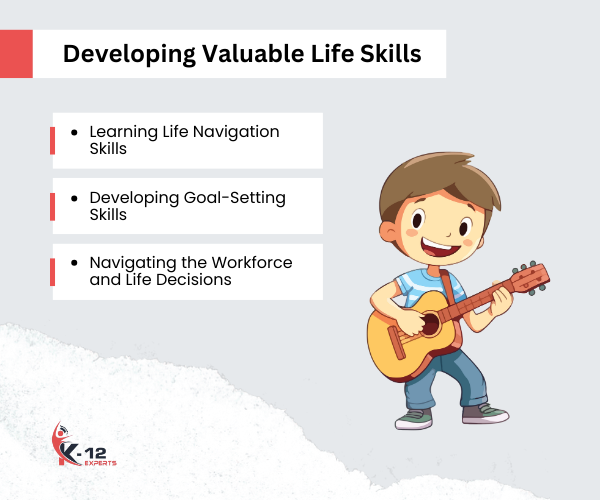
You’ll learn life navigation skills, such as prioritizing tasks, managing your time, and balancing multiple responsibilities.
Additionally, you’ll develop goal-setting skills, which will help you create a clear vision for your future and work towards achieving it.
These skills will benefit you far beyond your school years as you navigate the workforce and make important life decisions.
Fostering Social Connections
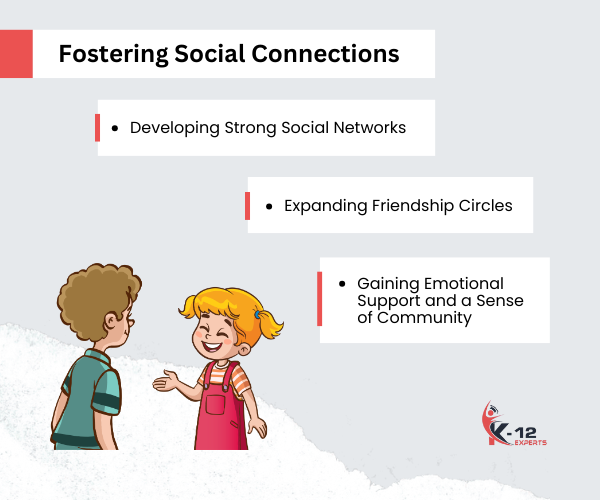
Through your involvement in extracurricular activities, you’ll have ample opportunities to form lasting bonds with like-minded individuals who share your passions and interests.
You’ll develop strong social networks that will benefit you throughout your life. As you work together towards common goals, you’ll create meaningful relationships that extend beyond the activity itself.
Your friendship circles will expand, and you’ll find a sense of belonging among peers who understand and support you. Furthermore, these connections can provide emotional support, encouragement, and a sense of community, which is especially valuable for low-income students who may face unique challenges.
Gaining Access to Resources
Throughout your involvement in extracurricular activities, you’ll gain access to resources that can substantially augment your academic, personal, and professional growth. By participating in clubs or sports teams, you’ll tap into a network of resources, including experienced mentors, state-of-the-art facilities, and skill-building workshops.
| Resource Type | Benefits |
| Mentorship | Guidance from experienced professionals or coaches |
| Facilities and Equipment | Access to state-of-the-art facilities and equipment |
| Skill-Building Workshops | Opportunities to develop new skills and enhance existing ones |
| Networking Opportunities | Connections to peers and professionals in your field |
| Financial Literacy Programs | Education on resource allocation and responsible financial decision-making |
Overcoming Economic Barriers
Many students face significant economic hurdles, but participating in extracurricular activities can surprisingly help you overcome these barriers and achieve your academic and professional goals despite financial constraints.
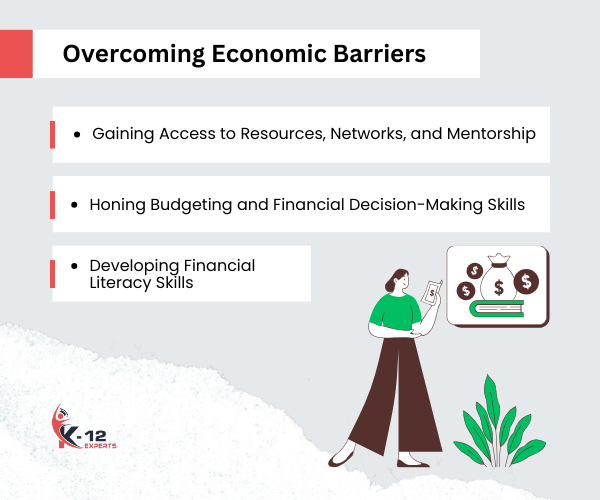
By joining clubs or teams, you’ll gain access to resources, networks, and mentorship that can aid in your economic empowerment.
You’ll also develop valuable skills, such as financial literacy, that will serve you well in managing scholarships, grants, and part-time jobs.
As you take on leadership roles or participate in fundraising events, you’ll hone your ability to budget, prioritize, and make smart financial decisions.
Managing Time Effectively
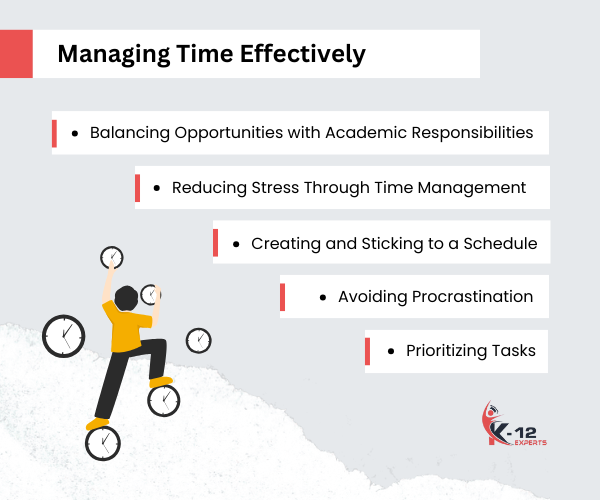
As you successfully navigate economic barriers, you’ll want to develop the skills to balance your newfound opportunities with academic responsibilities, and that’s where effective time management comes in.
You’re taking on new challenges and responsibilities, and prioritizing tasks is crucial to maintaining a healthy balance.
Start by making a schedule and sticking to it, setting realistic goals for each day and week. Be honest with yourself about how much time you have to dedicate to each activity, and avoid procrastination by breaking tasks into manageable chunks.
As you master time management, you’ll find that you’re not only more productive but also less stressed.
Balancing School and Activities
Your ability to balance school and extracurricular activities hinges on understanding that they’re not mutually exclusive but rather complementary aspects of your educational experience.
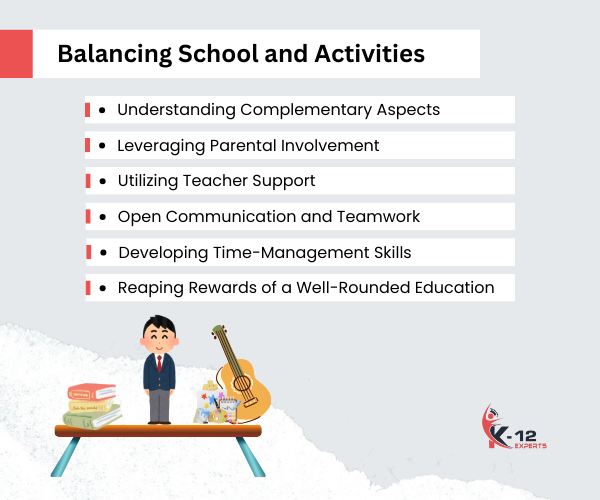
You’re not alone in this balancing act – leveraging parental involvement and teacher support can make all the difference.
By keeping your parents in the loop about your schedule and commitments, they can offer valuable guidance and help you prioritize tasks.
Your teachers can also provide accommodations and flexibility when needed.
Don’t be afraid to ask for help when you’re struggling to meet deadlines or attend rehearsals.
With open communication and teamwork, you can navigate the demands of school and activities, developing essential time-management skills and reaping the rewards of a well-rounded education.
Expanding Career Opportunities
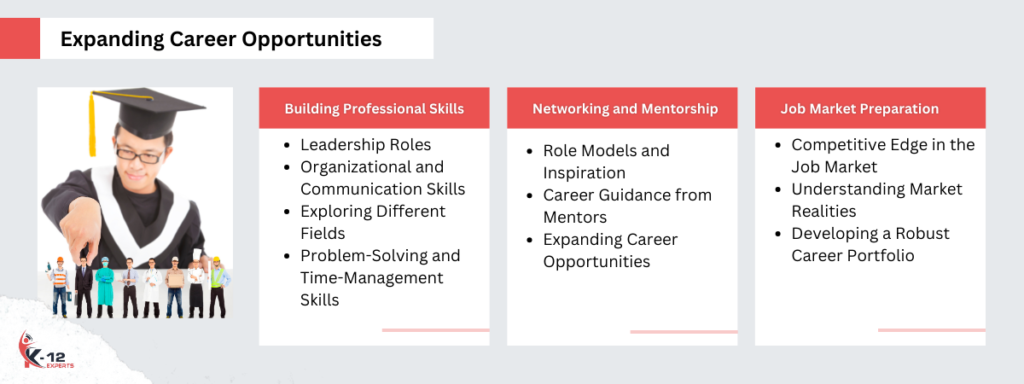
As you participate in extracurricular activities, you’re not only enriching your school experience but also laying the groundwork for a successful career.
By taking on leadership roles, collaborating with others, and managing projects, you’ll build professional skills that are highly valued by employers.
These experiences will also open doors to networking and mentorship opportunities, preparing you to navigate the job market with confidence and poise.
Building Professional Skills
Participating in extracurricular activities can substantially enhance your professional skills, opening doors to new career opportunities and giving you a competitive edge in the job market.
By taking on leadership roles, you’ll develop strong organizational and communication skills, learning to motivate and manage teams.
You’ll also have the chance to explore different fields and industries, helping you make informed decisions about your future career path.
As you navigate various activities, you’ll refine your problem-solving and time-management skills, becoming more adaptable and resilient.
This skill development won’t only boost your confidence but also make you a more attractive candidate to potential employers.
Networking and Mentorship
Beyond developing valuable skills, extracurricular activities also offer a powerful platform for networking and mentorship, connecting you with like-minded individuals, experienced professionals, and industry leaders who can help expand your career opportunities.
As you engage in these activities, you’ll gain exposure to role models who can inspire and motivate you to pursue your passions. You’ll also receive valuable career guidance from mentors who understand the industry and can provide tailored advice.
These connections can be transformative, opening doors to new experiences, internships, and job opportunities that might’ve been out of reach otherwise.
Job Market Preparation
Engaging in extracurricular activities equips you with a competitive edge in the job market, allowing you to showcase a unique blend of skills, experience, and personal qualities that employers increasingly value. You’ll gain a deeper understanding of market realities and develop a robust career portfolio that highlights your achievements. This, in turn, will help you stand out in a crowded job market.
| Skills | Experience | Personal Qualities |
| Leadership | Team projects | Communication |
| Problem-solving | Event planning | Time management |
| Collaboration | Volunteer work | Adaptability |
| Critical thinking | Research projects | Resilience |
| Creativity | Entrepreneurial ventures | Confidence |
Enhancing Academic Performance
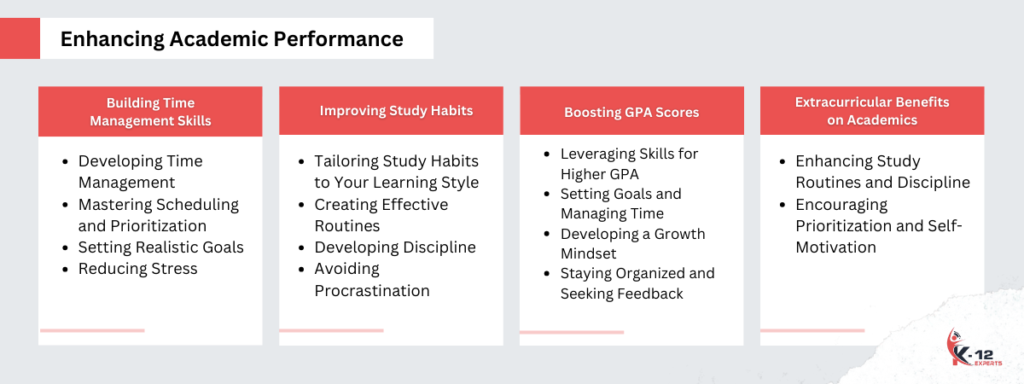
As you juggle schoolwork and extracurricular activities, you’re probably wondering how you’ll manage it all, but the truth is that participating in extracurricular activities can actually help you build time management skills, improve your study habits, and even boost your GPA scores.
You’ll learn to prioritize tasks, set realistic goals, and stay focused on what needs to be done.
Building Time Management Skills
When you participate in extracurricular activities, you develop essential time management skills that help you prioritize tasks, set realistic goals, and balance academic responsibilities with other obligations.
As you navigate busy schedules, you’ll master personal scheduling and prioritization strategies.
You’ll learn to create schedules that work for you, not against you.
Prioritizing tasks will become second nature.
Balancing multiple responsibilities will help you stay organized and focused.
Setting realistic goals will boost your confidence and motivation.
Managing your time effectively will reduce stress and anxiety.
Improving Study Habits
Participating in extracurricular activities can have a profound impact on your academic performance, as you’ll develop study habits that are tailored to your unique learning style and needs. By balancing schoolwork and activities, you’ll create effective study routines that work for you. This helps you develop academic discipline, ensuring you stay on top of your work even when faced with challenging deadlines. You’ll also learn to prioritize tasks and avoid procrastination.
| Benefits of Extracurricular Activities | Impact on Academic Performance |
| Develops effective study routines | Improves time management skills |
| Enhances academic discipline | Boosts responsibility and accountability |
| Encourages prioritization | Reduces stress and anxiety |
| Fosters self-motivation | Promotes a growth mindset |
Boosting GPA Scores
By building on the academic discipline and effective study routines you’ve developed through extracurricular activities, you can now leverage these skills to boost your GPA scores and take your academic performance to the next level.
You’re more focused, driven, and committed to achieving your GPA targets. Your Academic Motivation has increased, and you’re now more proactive in seeking help when needed.
Set specific, achievable goals for each semester and track your progress.
Prioritize your tasks and manage your time more efficiently.
Develop a growth mindset and view challenges as opportunities for growth.
Seek feedback from teachers and peers to identify areas for improvement.
Stay organized and keep track of assignments and deadlines to avoid last-minute cramming.
Frequently Asked Questions
Q1: What Types of Extracurricular Activities Are Most Beneficial for Low-Income Students?
You’d think it’s ironic that the most beneficial extracurricular activities for low-income students aren’t the most expensive ones. Actually, sports programs and art clubs can be game-changers, helping you build confidence, friendships, and a sense of belonging.
Q2: How Do Extracurricular Activities Affect Low-Income Students’ Mental Health?
When you participate in extracurricular activities, you’ll discover they’re stress reduction powerhouses and incredible self-esteem boosters, helping you tackle life’s challenges with confidence and poise, which is especially vital during turbulent times.
Q3: Can Extracurricular Activities Help Low-Income Students With College Admissions?
As you navigate college prep, don’t you wish you had a leg up on the competition? By participating in extracurricular activities, you’ll gain invaluable networking opportunities, making your college admissions journey less intimidating and more achievable.
Q4: Are There Any Extracurricular Activities That Are Specifically Designed for Low-Income Students?
You’ll find many extracurricular activities specifically designed for low-income students, including community outreach initiatives and mentorship programs that offer guidance and support to help you navigate challenges and achieve your goals.
Q5: How Can Low-Income Students Find and Apply for Extracurricular Activities With Limited Resources?
You’re facing a million obstacles, but don’t let limited access hold you back! Utilize online resources like scholarships.com, fastweb.com, or after-school programs’ websites to find and apply for extracurricular activities that fit your interests and budget.
Conclusion
You’ve empowered yourself by embracing extracurricular activities, quietly chipping away at the obstacles that once seemed insurmountable.
Your newfound confidence and life skills have become the great equalizers, bridging the gap between economic disparities.
As you master time management and goal-setting, your future brightens, illuminated by the promise of expanded career opportunities and enhanced academic performance.
Your determination has transformed you, rendering economic barriers all but a distant memory.

